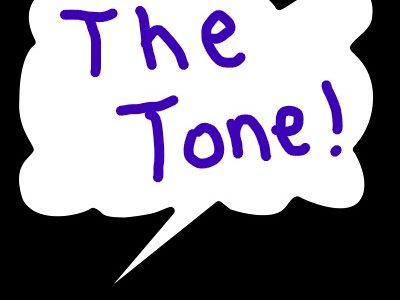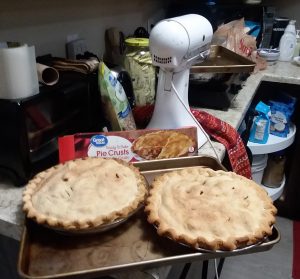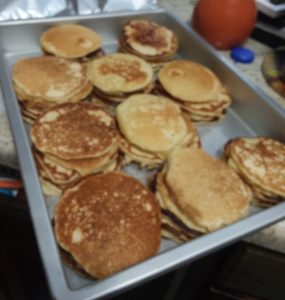 Recently I was taken back in time as I listened to a soundtrack by John Denver. He was a singer-songwriter from the1960s through the 1990s. I was a young teen when he began his career and I enjoyed his music.
Recently I was taken back in time as I listened to a soundtrack by John Denver. He was a singer-songwriter from the1960s through the 1990s. I was a young teen when he began his career and I enjoyed his music.
One song, that I listened to on this day was particularly meaningful – Welcome to My Morning. Look at the opening stanza.
Welcome to my morning
Welcome to my day
I’m the one responsible
I made it just this way
Many years ago, I finally understood and came to believe that I was truly responsible for how my days look. That belief can be a bit intimidating because if it is true then we must take 100% responsibility. Yikes! We must give up blame. Double yikes! We must stop being victims. Triple yikes!!!
But it’s true. And here is why. We cannot control other people or their actions. We cannot always control the circumstances that we find ourselves in. But we can always control our response to them. That is the key to the tenor of our days – our response.
Make Controlling Your Response a Daily Practice
It isn’t always easy to stay in control of our response but there are a few things that we can practice daily that will help us get better at it.
• Pay attention to your thoughts – Thoughts generate emotions and emotions move us to action. Our action will trigger a result, either positive or negative. So, it’s important to monitor your thoughts. Make the effort to keep them positive. Don’t let your mind make stuff up which it will try to do. Our mind wants to make sense out of things and sometimes we put our own spin on the facts.
• Think the best of others – It is easy to have negative thoughts about others and their motives, but if we make it a practice to think the best rather than the worst it goes a long way to helping us control our response. When someone cuts us off in traffic we can think, “That dumb jerk.” Or we can think, “She must be in a real hurry. I hope she gets there safely.” We get to decide how we will view the actions of others. When we decide to think the best of others, we can manage our thoughts better
• Give up blame. Blame is always an indicator there’s a problem with our way of being or how we perceive what’s happening. Taking responsibility for how we perceive what’s happening can and does make a difference in our outcomes.
• Practice gratitude. It’s remarkable how thought shifting gratitude can be. For many, it doesn’t come naturally because life is hard. People are rude and inconsiderate. Bad things do happen to good people. But gratitude is something we can cultivate and when we do, it goes a long way to helping us have more positive thoughts. That leads us to better responses, and we have better outcomes.
I love this example from my friend April Hiatt, who had attended a class I taught on this topic. She was practicing giving up blame, thinking the best of others, and being grateful.
“I opened the dryer door to discover wet clothes. Jonathan (my 14-year-old) didn’t press the start button when he transferred loads. I was three words into my grumble when I heard myself say out loud “Oh, I’m so glad I checked the dryer.” The next words were of understanding, with a deep feeling of love . “I’ve done this same thing before .” This whole cycle took under 3 seconds, and it happened without me really thinking about it. Wow, I’m amazed.”
We need to make setting our intention for the day a practice. We will have to do this our whole lives. Eventually, it does become easier, but it is a life-long work. We must decide that we’re going to have a good day. We must decide that people are basically kind. We must decide that life is good. These daily decisions help us respond better.
When you wake up and have a headache you can roll over and think, “This is going to be a lousy day.” Or you can close your eyes and think, “I’m glad I have something I can take for this.”
I know, it feels irritating to even think about it. That’s exactly how I felt when I first learned this principle, that I am responsible for how my life feels. But I want you to know that as I embraced this truth it changed my world. It gave me all the power!
You can listen to John Denver’s beautiful song HERE. Enjoy.



 Here is the definition of shame – a painful feeling of humiliation or distress caused by the consciousness of wrong or foolish behavior.
Here is the definition of shame – a painful feeling of humiliation or distress caused by the consciousness of wrong or foolish behavior.
 My husband bought a pergola for our patio. It was a necessity because the west sun is so hot that you can’t even turn the doorknob in mid-summer.
My husband bought a pergola for our patio. It was a necessity because the west sun is so hot that you can’t even turn the doorknob in mid-summer. own. Don did one but with a replaced hip he knew he could
own. Don did one but with a replaced hip he knew he could The day I needed to drill into cement and put in long screws and tighten them down I found myself in the same dilemma. But I remembered that pill experience which I had had only a few months earlier.
The day I needed to drill into cement and put in long screws and tighten them down I found myself in the same dilemma. But I remembered that pill experience which I had had only a few months earlier.

 I got a fabulous call recently from a dear friend. She wanted to tell me about her three grandchildren, twins, aged 8 and one, aged 5. They have been playing a game with their grandma when she takes them to school 3 times a week. It’s called, Embellish the Story. One of them begins the story and then they each take a turn adding to it. In other words, they embellish it.
I got a fabulous call recently from a dear friend. She wanted to tell me about her three grandchildren, twins, aged 8 and one, aged 5. They have been playing a game with their grandma when she takes them to school 3 times a week. It’s called, Embellish the Story. One of them begins the story and then they each take a turn adding to it. In other words, they embellish it.
 I love to write but don’t always want to prepare and post a new article every week. I enjoy posting something of value every day on Facebook but sometimes I would rather do other things. However, I do both as perfectly as I can because I have a goal and to reach it, I have learned that there must be consistency in my effort, for as long as it takes.
I love to write but don’t always want to prepare and post a new article every week. I enjoy posting something of value every day on Facebook but sometimes I would rather do other things. However, I do both as perfectly as I can because I have a goal and to reach it, I have learned that there must be consistency in my effort, for as long as it takes. important in parenting because it nearly always takes until a child leaves home and creates their own life to see the results of our efforts. While they’re growing, it’s tempting to let ourselves feel failure because we don’t see our child as neat, quiet, mannerly and so forth. We often see a mud-covered child, a snitched cookie behind a back, spilled milk on the kitchen floor, or we hear voices’ complaining that it’s not their fault or “it’s my turn.”
important in parenting because it nearly always takes until a child leaves home and creates their own life to see the results of our efforts. While they’re growing, it’s tempting to let ourselves feel failure because we don’t see our child as neat, quiet, mannerly and so forth. We often see a mud-covered child, a snitched cookie behind a back, spilled milk on the kitchen floor, or we hear voices’ complaining that it’s not their fault or “it’s my turn.”
 Recently, while at a friend’s home, she talked to me about the challenge of managing all the stuff in her home. Now let me clearly state that her home is clean and orderly. She isn’t having a problem with clutter or mess. But she has accumulated a lot of stuff over the years.
Recently, while at a friend’s home, she talked to me about the challenge of managing all the stuff in her home. Now let me clearly state that her home is clean and orderly. She isn’t having a problem with clutter or mess. But she has accumulated a lot of stuff over the years. Los Angeles families and found all the mothers’ stress hormones spiked during the time they spent dealing with their household paraphernalia (Arnold, et al, Life at Home in the Twenty-First Century).
Los Angeles families and found all the mothers’ stress hormones spiked during the time they spent dealing with their household paraphernalia (Arnold, et al, Life at Home in the Twenty-First Century).




 her she said that she was having tons of visits and treats but that her family could use some nurturing. Hence one apple pie.
her she said that she was having tons of visits and treats but that her family could use some nurturing. Hence one apple pie. Saturday morning our church planned a Christmas breakfast. That’s right, breakfast. I would have opted to take a breakfast casserole, but my husband has a family tradition of Green Chili Pancakes and it’s so unique that he really wanted to share
Saturday morning our church planned a Christmas breakfast. That’s right, breakfast. I would have opted to take a breakfast casserole, but my husband has a family tradition of Green Chili Pancakes and it’s so unique that he really wanted to share  it. The problem is, he doesn’t know how to make it, I do. His grannie taught me. : ) So I needed to make 50 pancakes and then a huge pot of the green chili sauce. It was too much to do Saturday morning, so it had to be done on Friday. This is very delicious by the way.
it. The problem is, he doesn’t know how to make it, I do. His grannie taught me. : ) So I needed to make 50 pancakes and then a huge pot of the green chili sauce. It was too much to do Saturday morning, so it had to be done on Friday. This is very delicious by the way.  Long story. And I also realized that I needed a formatted document to include with a special framed family genealogy chart we are sending to our children. We are direct descendants of William Brewster of the Mayflower and I wanted to help each family understand who he was, what his family was like, and why they came to America.
Long story. And I also realized that I needed a formatted document to include with a special framed family genealogy chart we are sending to our children. We are direct descendants of William Brewster of the Mayflower and I wanted to help each family understand who he was, what his family was like, and why they came to America. It’s Saturday morning now. The church breakfast is done. The chili pancakes were a success. Everyone loved the pies which have been eaten and I am heading off to do the tent kit and get the rest of the stuff wrapped and shipped. My house is a disaster and the kitchen cabinets can’t even be seen. I haven’t vacuumed, dusted, or cleaned anything. Laundry is piling up but I did get one load in before the breakfast. Another big woohoo!
It’s Saturday morning now. The church breakfast is done. The chili pancakes were a success. Everyone loved the pies which have been eaten and I am heading off to do the tent kit and get the rest of the stuff wrapped and shipped. My house is a disaster and the kitchen cabinets can’t even be seen. I haven’t vacuumed, dusted, or cleaned anything. Laundry is piling up but I did get one load in before the breakfast. Another big woohoo!


